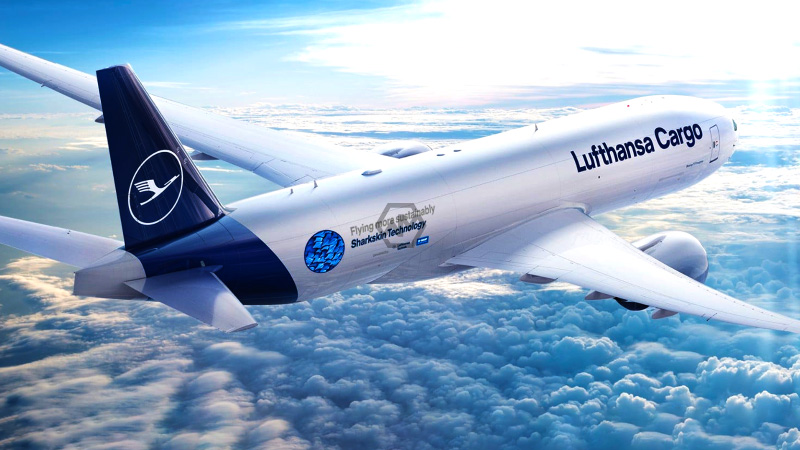- Austrian Airlines will apply AeroSHARK technology to its Boeing 777-200ERs starting December 2024.
- The technology, inspired by shark skin, aims to reduce fuel consumption by about 1% per flight.
- The retrofit is expected to save around 8,300 metric tons of CO2 over four years.
Austrian Airlines is set to be the first carrier to introduce AeroSHARK technology to its fleet of Boeing 777-200ER aircraft.
This innovative surface film, developed by Lufthansa Technik and BASF, mimics the texture of shark skin to reduce aerodynamic drag. By applying this technology, the airline aims to achieve significant fuel savings and contribute to its environmental goals.
Austrian Airlines to Cut CO2 with Innovative Shark Skin Technology
The AeroSHARK film, consisting of riblets around 50 micrometers thick, will be applied to approximately 830 square meters of each aircraft’s fuselage and engine nacelles. The retrofit is scheduled to be completed by March 2025 and is expected to lower fuel consumption by about one percent per flight. This incremental installation will help Austrian Airlines move closer to its CO2 reduction targets.
The introduction of AeroSHARK is part of a broader initiative by Austrian Airlines to enhance fuel efficiency and meet its sustainability objectives. Over the next four years, the retrofit is expected to result in the reduction of around 8,300 metric tons of CO2 emissions. This effort underscores the airline’s commitment to environmental stewardship.
The retrofit process will involve applying around 830 square meters of riblet film to each aircraft. This procedure will be carried out incrementally, with the final installation expected by March 2025. The technology has already been adopted by 17 Lufthansa Group aircraft, demonstrating its effectiveness in reducing fuel consumption.
Harald Gloy, COO at Lufthansa Technik, highlighted the significance of this advancement, noting that even a modest efficiency gain can lead to substantial environmental benefits. Francesco Sciortino, COO at Austrian Airlines, echoed this sentiment, emphasizing the importance of such innovations in achieving long-term sustainability goals.
Austrian Airlines’ adoption of AeroSHARK technology represents a significant step towards reducing its carbon footprint and enhancing fuel efficiency. This initiative not only aligns with the airline’s environmental objectives but also sets a precedent for other carriers in the industry.
“At one percent, the sharkskin’s efficiency potential may not sound like much, but in total it will save thousands of tons of CO2 per year on long-haul flights,” highlighted Francesco Sciortino, chief operating officer at Austrian Airlines.



